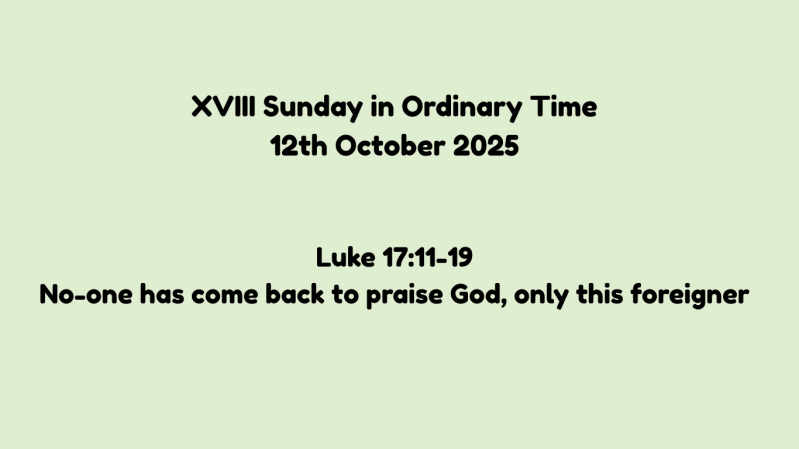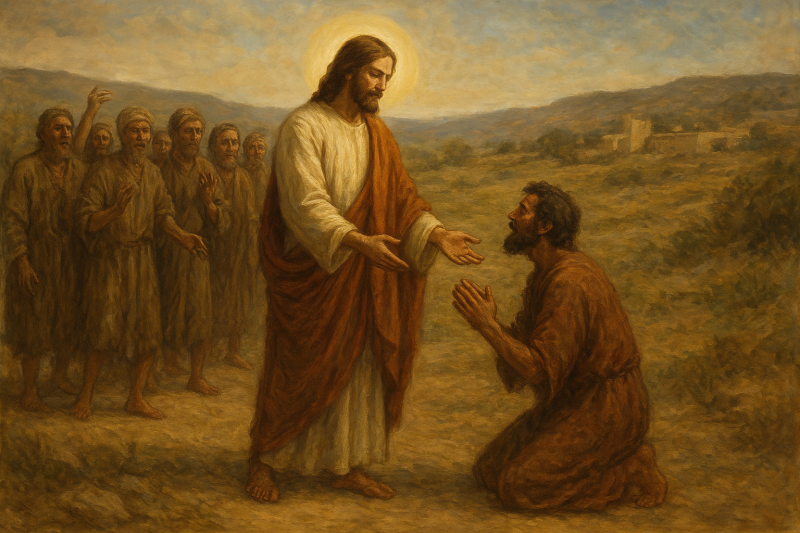

On the way to Jerusalem Jesus travelled along the border between Samaria and Galilee. As he entered one of the villages, ten lepers came to meet him. They stood some way off and called to him, ‘Jesus! Master! Take pity on us.’ When he saw them he said, ‘Go and show yourselves to the priests.’ Now as they were going away they were cleansed. Finding himself cured, one of them turned back praising God at the top of his voice and threw himself at the feet of Jesus and thanked him. The man was a Samaritan. This made Jesus say, ‘Were not all ten made clean? The other nine, where are they? It seems that no one has come back to give praise to God, except this foreigner.’ And he said to the man, ‘Stand up and go on your way. Your faith has saved you.’
The Gospel for the 28th Sunday in Ordinary Time indicates the need of thanksgiving. We often pray to God for help or grace, which is good and necessary, but the Lord wants to make us aware of the attitude of gratitude to Him.
Jesus Christ, as usual, goes to the place to preach the Good News and this time he is in a place between the two provinces of Palestine, Galilee and Samaria. He meets 10 people with leprosy, asking him to heal us of our suffering. Thanks to their determination, they became healthy.
However, the key point of the whole meeting is not the healing situation, but the feeling of thanksgiving of one of the 10 men. This person felt the need to give thanks as he fell before Jesus. And he was a Samaritan, a man disliked by men because the Jewish people were so suspicious to foreigners, which gives us a better view of the story.
Why is it so important to stand before God and give thanks? First, it makes humble and strengthens my relationship with Christ. Having a sense of thanksgiving, I know that all I am, I thank God and His Providence, even my hard work is connected to His presence and care.
To understand this, let me say a story. A man came to church every day for five minutes of prayer. Some of us might say it was so little, but those 5 minutes belonged to his 30-minute lunch break, and the place of work was so far from the church. Mostly the break time was used for travel to the church and back to work so that he could spend 5 minutes with the Lord. His prayer was so simple; Oh Lord, I am here, I am so happy, I have become your friend and You have taken my sins away. Thank you, Jesus.
One day the man did not come because he fell ill, he stayed in the hospital. The experience of sickness and suffering was a blessing to many, especially for the hospital staff. Someone asked him, tell me, you are sick and in pain, you are so joyful, full of peace and hope.
The man replied, I tell you something; Every day for 5 minutes I have a wonderful guest, this is Jesus Christ saying to me: O my son, I am so happy, I have become your friend, that I could take your sins, thank you.
This story, whether in the real world or not, shows us that our thanksgiving and commitment to the Lord never remains idle. God always uses the attitude of humility and gratitude for the greater thing, making us more powerful people of faith.
Ask the Lord for favors and help, but don't forget to say, thank you, my God. Amen.

Stało się, że Jezus zmierzając do Jerozolimy przechodził przez pogranicze Samarii i Galilei. Gdy wchodził do pewnej wsi, wyszło naprzeciw Niego dziesięciu trędowatych. Zatrzymali się z daleka i głośno zawołali: "Jezusie, Mistrzu, ulituj się nad nami". Na ich widok rzekł do nich: "Idźcie, pokażcie się kapłanom". A gdy szli, zostali oczyszczeni. Wtedy jeden z nich widząc, że jest uzdrowiony, wrócił chwaląc Boga donośnym głosem, upadł na twarz do nóg Jego i dziękował Mu. A był to Samarytanin. Jezus zaś rzekł: "Czy nie dziesięciu zostało oczyszczonych? Gdzie jest dziewięciu? Żaden się nie znalazł, który by wrócił i oddał chwałę Bogu, tylko ten cudzoziemiec". Do niego zaś rzekł: "Wstań, idź, twoja wiara cię uzdrowiła".
Ewangelia na XXVIII Niedzielę Zwykłą wskazuje na potrzebę dziękczynienia. Często modlimy się do Boga o pomoc lub łaskę, co jest dobre i konieczne, ale Pan chce nas uwrażliwić na postawę wdzięczności wobec Niego.
Jezus Chrystus, jak zwykle, udaje się w miejsce, aby głosić Dobrą Nowinę, a tym razem znajduje się na pograniczu dwóch prowincji Palestyny: Galilei i Samarii. Spotyka dziesięciu trędowatych, którzy proszą Go, by uzdrowił ich z cierpienia. Dzięki ich determinacji zostali uzdrowieni.
Jednak kluczowym momentem całego spotkania nie jest sama sytuacja uzdrowienia, ale uczucie wdzięczności jednego z dziesięciu mężczyzn. Ten człowiek odczuł potrzebę podziękowania, upadłszy przed Jezusem. Był Samarytaninem, człowiekiem niedarzonym sympatią przez innych, bo Żydzi byli bardzo podejrzliwi wobec obcych, co daje nam pełniejszy obraz tej historii.
Dlaczego tak ważne jest, by stanąć przed Bogiem i dziękować? Po pierwsze, to czyni mnie pokornym i umacnia moją relację z Chrystusem. Mając poczucie wdzięczności, wiem, że wszystko, czym jestem, zawdzięczam Bogu i Jego Opatrzności, nawet mój trud i wysiłek są związane z Jego obecnością i troską.
Aby to lepiej zrozumieć, pozwólcie, że opowiem pewną historię. Pewien mężczyzna przychodził codziennie do kościoła na pięć minut modlitwy. Niektórzy mogliby powiedzieć, że to bardzo mało, ale te pięć minut było częścią jego trzydziestominutowej przerwy obiadowej, a miejsce pracy znajdowało się daleko od kościoła. Większość przerwy zajmowała mu podróż do kościoła i powrót do pracy, by móc spędzić pięć minut z Panem. Jego modlitwa była bardzo prosta: O Panie, jestem tutaj, jestem taki szczęśliwy, stałem się Twoim przyjacielem, a Ty zabrałeś moje grzechy. Dziękuję Ci, Jezu.
Pewnego dnia mężczyzna nie przyszedł, bo zachorował i trafił do szpitala. Doświadczenie choroby i cierpienia stało się błogosławieństwem dla wielu, szczególnie dla personelu szpitala. Ktoś go zapytał: powiedz, jesteś chory i cierpisz, a jednak jesteś taki radosny, pełen pokoju i nadziei.
Mężczyzna odpowiedział: Powiem ci coś; każdego dnia przez pięć minut mam cudownego gościa, to Jezus Chrystus, który mówi do mnie: O mój synu, jestem taki szczęśliwy, że stałem się twoim przyjacielem, że mogłem wziąć twoje grzechy, dziękuję ci.
Ta historia, niezależnie od tego, czy wydarzyła się naprawdę, pokazuje nam, że nasze dziękczynienie i oddanie wobec Pana nigdy nie pozostają bezowocne. Bóg zawsze wykorzystuje postawę pokory i wdzięczności do większych dzieł, czyniąc nas silniejszymi ludźmi wiary.
Prośmy Pana o łaski i pomoc, ale nie zapominaj powiedzieć: dziękuję Ci, mój Boże. Amen.
Add comment
Comments